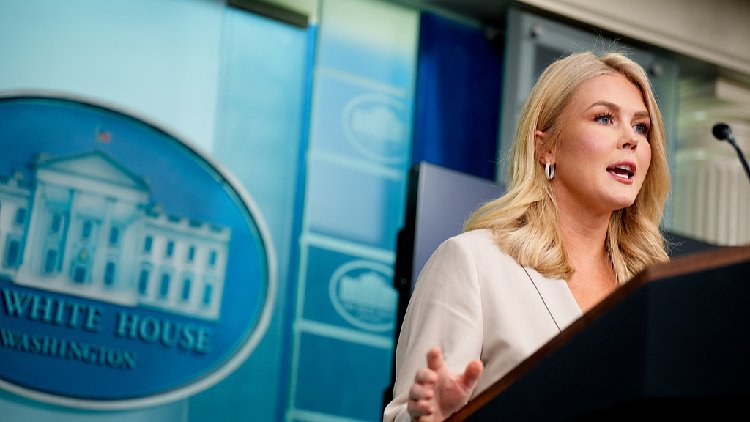White House Announces Immediate Implementation of Broad Tariffs
On Tuesday, the White House confirmed that U.S. President Donald Trump will announce new tariffs on Wednesday, but specific details regarding the magnitude and extent of these trade barriers, which have caused concern among businesses, consumers,...

White House spokesperson Karoline Leavitt stated that reciprocal tariffs on countries imposing duties on U.S. goods would be implemented immediately following Trump's announcement, which is set for 4 p.m. Eastern Time. Additionally, a 25 percent tariff on auto imports is scheduled to take effect on April 3.
The specifics of Trump's Wednesday announcement remain unclear. As reported by the Washington Post, aides are exploring a plan that could raise duties on products by approximately 20 percent from nearly all countries, rather than selectively targeting specific nations or goods. The administration projects that these new duties could generate over $6 trillion in revenue, potentially allowing for rebates to American citizens, according to the report.
The Wall Street Journal, citing informed sources, mentioned that the U.S. trade representative is preparing an option for a broad tariff on a select group of nations, likely resulting in lower rates than the proposed 20 percent universal tariff.
Concerns About Economic Recession
Economists have raised alarms regarding the risk of a recession, suggesting that Trump's heavy focus on tariffs is undermining investor, consumer, and business confidence, which could in turn slow economic activity and drive up prices.
Multiple business and household surveys indicate a decline in confidence regarding the economic outlook, with fears that Trump's tariffs could reignite inflation. Data from the Conference Board shows that consumer sentiment in the U.S. took its largest monthly hit in over four years in February, as worries about inflation growth increased. The Yale University Budget Lab estimated that a 20 percent tariff on top of existing tariffs would cost the average U.S. household at least $3,400.
"There's an initial, one-time increase in inflation at the price level because firms have to raise prices to offset the impact of tariffs," said Ryan Swift, chief bond strategist at BCA Research. "But over the medium term, tariffs would actually slow manufacturing activity, which means less demand... and inflation will end up lower than what it would have been otherwise just because the economy is hurt. It reflects recession expectations."
Goldman Sachs recently raised its 12-month recession probability estimate to 35 percent from 20 percent, pointing to a reduced growth forecast for the fourth quarter, declining consumer confidence, and "statements from White House officials indicating willingness to tolerate economic pain."
Signs of a decelerating U.S. economy are already apparent, partly due to uncertainty stemming from Trump's unpredictable economic policy approach. The Institute for Supply Management reported a contraction in U.S. manufacturing activity after two consecutive months of growth, noting that goods producers faced their highest input costs in nearly three years, with tariffs identified as a primary source of concern among factory managers.
"Rising prices while business activity slows imply the economy could be heading into stagflation," commented Jeffrey Roach, chief economist at LPL Financial.
As a reaction to these uncertainties, investors have aggressively sold stocks for over a month, resulting in a nearly $5 trillion drop in U.S. stock values since mid-February. On Tuesday, Wall Street closed mixed as investors awaited more information following Trump's forthcoming announcement.
International Responses
The ramifications of these trade developments are not limited to the U.S. Manufacturing sectors worldwide, including those in Japan, Britain, and Canada, have reported activity declines in March as businesses prepared for Trump's new tariffs, although some companies sought to expedite shipments in anticipation of the new measures.
Canada has committed to implementing its own tariffs in response. "We will not disadvantage Canadian producers and Canadian workers relative to American workers," stated Prime Minister Mark Carney in Winnipeg.
Carney and Mexican President Claudia Sheinbaum discussed on Tuesday Canada's efforts to "fight unjustified trade actions" by the U.S., as outlined by the prime minister's office. They emphasized the need for preserving North American competitiveness while respecting national sovereignty during challenging times.
U.S. companies are already feeling the effects of a "Buy Canadian" movement, which has complicated the distribution of their products in Canada. Sheinbaum indicated on Tuesday that Mexico is ready to react to tariffs on its products. "Let them know that we are prepared. We meet two or three times a week with the team to strengthen the various measures," she stated.
Other nations have also threatened counteractions, even as they attempt to negotiate with the White House to avert tariffs. Japanese Prime Minister Shigeru Ishiba announced plans on Tuesday to offer financing and procurement support to domestic companies facing the impact of additional U.S. tariffs on automobiles. He mentioned that if the U.S. proceeds with a 25 percent tariff on car imports, Japan would create consultation offices at approximately 1,000 locations nationwide to assist affected businesses.
Despite ongoing negotiations, it remains uncertain whether these discussions will yield results before Wednesday's announcement. However, there is hope that they may encourage Trump to reconsider his stance in the upcoming weeks, according to sources familiar with the discussions.
Anna Muller for TROIB News
Find more stories on Business, Economy and Finance in TROIB business












